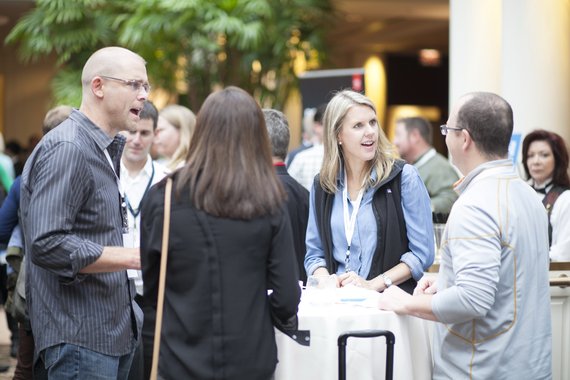Here in Silicon Valley, the conference circuit is in full swing. VMworld brought tens of thousands to San Francisco last month and Dreamforce is gearing up for its 12th year in a few short weeks. No matter what industry you work in, chances are you've attended a conference or at least been invited to several.
That's not surprising, given the conference industry is massive -- in 2012 alone, 225 million attendees participate in 1.87 million conventions, conferences, and other events according to the most recent data from the Convention Industry Council. The sheer scale of the industry backs up this fact: conferences are an incredibly important tool not only for the individual, but also for the industry as a whole.
Industry events are a great way to learn about new technologies and products that can enhance your work, but they're much more than that. Conferences allow you to engage in high energy networking opportunities, hear case studies and tips from peers, and share your own best practices and challenges. All of this emphasizes the power of knowledge sharing. When surrounded by hundreds of professionals all seeking to learn, you're bound to leave the conference with more than a lanyard.
Take Dreamforce coming up next month. Over the last 12 years Salesforce has created an industry conference focused on connecting with customers and building a modern business. How does Dreamforce boast numbers like 130,000 attendees from 82 countries? Knowledge sharing. They've built an agenda that's dedicated to the exchange of valuable information and learning. Repeat attendees know that in addition to big names like Hillary Clinton, Al Gore, and Bruno Mars, they're getting actionable lessons they can bring back to their companies.
I'm always blown away by the amount of knowledge sharing happening at the conferences I attend -- in sessions, during lunch, in the halls, and at evening receptions. In the spirit of knowledge sharing, here is just a small taste of content marketing lessons I've learned at recent marketing conferences:
Don't take shortcuts. If you do, readers will notice. Content performs better when it's unique, relevant, and useful. To create valuable content, you have to understand what the demand is. What do people want to read? What kinds of content are they looking for? Once you understand that, it's about investing the time and energy it takes to create great content. Build a team of content professionals who have the analytical skills, creativity and writing prowess you need. Also, avoid cutting corners like overusing syndication. When your content is high quality, you'll see the impact on your bottom line.
Content metrics that matter. Many marketers immediately think "traffic" when it comes to content metrics, but reputation can also be a strong element to track. When you understand what the reputation of your content pages is, you can work to improve the pages that fall short. Understand the factors that affect reputation and develop a methodology for measuring it in context, then put it in action.
Don't let the numbers overwhelm you. It can seem daunting when you first set out to measure your content's performance, considering how much data is available. Instead, first set goals for what you want to understand and then map out which types of metrics make sense for each aspect of your content. For example, to reach your brand awareness goals, you might target media impressions, share of voice, reach, and sentiment. Having a clear roadmap will transform the mountain of data into a manageable source of knowledge.
These are just a few of the countless lessons I've learned by taking advantage of the networking opportunities at marketing conferences, but it gives you a little sample of the power of knowledge sharing. Although I live in the Bay Area, many attendees at these conferences are from several states -- or countries -- away, making industry conferences one of the few chances they have to network internationally in a face-to-face setting. And once that in-person bond is created, newly connected marketers can then correspond digitally in the future.
The bottom line is, conferences matter. Identify events with an agenda and speakers who are most relevant to your needs, and make it a priority to attend. When you return to the office, badge still dangling from your bag and head full of new ideas, it'll be worth it.
